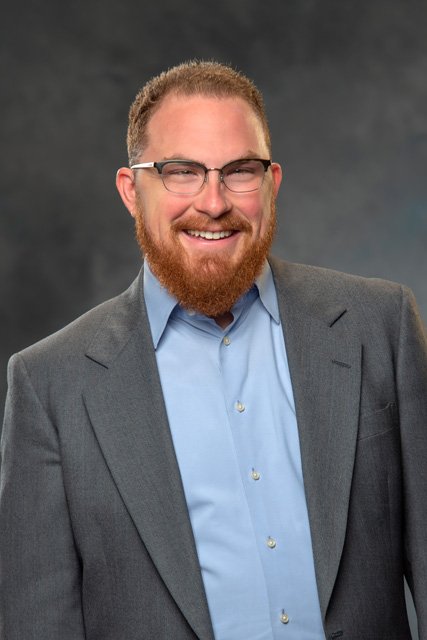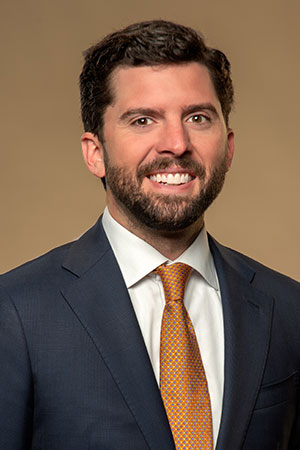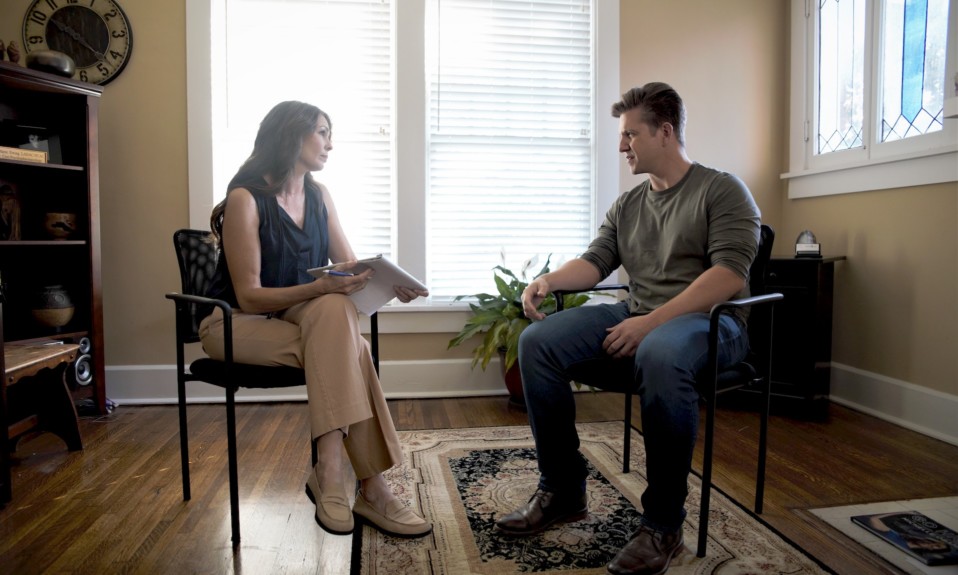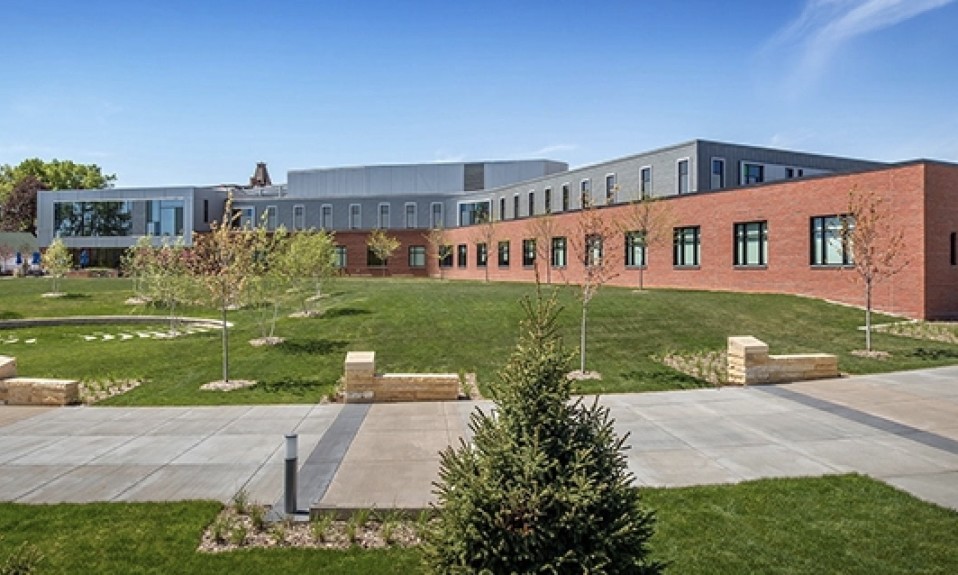Recognizing the critical importance of connection and community in recovery, providers are developing new programs and new tools to offer essential support
By Jennifer Taylor
Casey Hyatt was off the clock, driving along a winding road outside Nashville, when his cellphone rang. The rural stretch is known for its spotty cell service, but with a steep ditch on one side and a sheer rock wall on the other, Hyatt pulled onto a gravel turnout and answered the call. He knew the voice on the other end well. It was Clint, a recently discharged patient now in addiction recovery for the second time.
“He was in a deep, dark, desperate place where he was completely alone,” recalls Hyatt, the recovery care advocate coordinator and alumni liaison at Cumberland Heights, a nonprofit addiction treatment center in Tennessee. “And he reached out.”

Sitting at the roadside, Hyatt spoke to Clint for 45 minutes, answering a lot of what if-type questions. It was that point of connection that prompted Hyatt to note: “It’s not about the answers you give. It’s about the questions you ask,” a sentiment attributed to the French Enlightenment philosopher Voltaire. The moment was poignant for Hyatt and for the man struggling in recovery.
“I gave [him] that time, that day, to really ask himself what was important and what he wanted to do,” says Hyatt. “We have so little ground when you’re on the phone with someone; all they have to do is hang up. So it’s important that we’re able to maintain that relationship in a way that shows empathy and compassion.”
When the call ended, Clint returned to treatment—for what would be the last time. “He’s been sober ever since,” Hyatt says.
Recovery Through Connection
Clint’s story stands out to Hyatt not just because it was a success, but because it illustrates a key yet sometimes overlooked component in addiction treatment and recovery: connection.
The science of addiction recovery is still in its infancy. In that regard, treatment specialists point to the groundbreaking research of William White, an addiction and recovery author and retired research consultant for Illinois’s Chestnut Health Systems, and John Kelly, PhD, ABPP, the Elizabeth R. Spallin Professor of Psychiatry in Addiction Medicine at Harvard Medical School and founder and director of the Recovery Research Institute at Massachusetts General Hospital.
Organized addiction recovery took shape in 1935, when Bill Wilson, trying to maintain his own sobriety, founded the 12-step fellowship Alcoholics Anonymous to help treat people with alcohol use disorder (AUD). Wilson’s program began by connecting with others facing the same challenge. Since then, the 12 steps have evolved from the only recovery method in America to the foundation of recovery from substance use and process disorders. In fact, in recent years recovery has grown into its own aspect of care, with residential treatment centers building entire programs around recovery support and providing those in recovery with tools, technology and—most importantly—time.
“No matter how well you do in residential treatment, if you throw someone back into a cesspool of an environment without any support, they are going to relapse.”
—Michael Dennis, Lighthouse Institute
Michael Dennis, a senior research psychologist and director of the Lighthouse Institute, the research arm of Chestnut Health Systems, has been continuing White’s work in addiction recovery research. According to Dennis, residential treatment is only as good as its community reentry.

“No matter how well you do in residential treatment, if you throw someone back into a cesspool of an environment without any support, they are going to relapse,” Dennis says. In contrast, if patients are reintegrated with support, in a dry or supportive living environment, they are highly likely to stay in recovery. “It’s not rocket science,” says Dennis.
Recovery support services are broken down between continuing care, meaning when people are discharged from residential treatment and steered directly into the next level of care; and continuity of care, meaning people return for booster sessions. In other cases, recovery expands beyond a transition to recovery support, says Dennis. There are also complexities to navigate in transitioning back into housing, employment and the wider community, as well as seeking alcohol- or substance-free social gatherings, managing medication and staying out of jail.
Some of Dennis’ latest research involves new ways to maintain recovery. One ongoing study, in particular, is looking at creating “recovery management checkups,” which treat addiction as a chronic condition that requires disease management over time, similar to how the medical field manages diabetes.
Peer Support in Recovery
About five years ago, the leadership at Cumberland Heights launched an approach called Recovery Care Advocates (RCA) to bolster their patients’ success in recovery. The person-to-patient concept has since gained traction at many other treatment centers across the country, says Nicholas Hayes, PhD, Cumberland Heights’ chief science officer.
An RCA is a trained person on the recovery staff who is a point of connection for patients as they begin to assimilate back into their living environments. Patients are matched with an RCA whom they meet in the early stages of residential treatment. After discharge, the RCA remains in touch with the person at points over a 12-month period, a service that is included in Cumberland Heights’ price of treatment.
“We’ve really begun to better understand that behavioral health isn’t an acute experience. Progress takes place over time, not overnight.”
—Nicholas Hayes, Cumberland Heights
This is a tangible example of how the prolific work of White and Kelly on addiction and recovery has changed the landscape, says Hayes, with programs such as RCA that use human connection to manage recovery and to heal.

“What their research suggests is that we’ve really begun to better understand that behavioral health isn’t an acute experience,” Hayes says. “Progress takes place over time, not overnight. We know our patients have a lifelong illness, and we need to better support them over that early trajectory of discharge from our treatment programs so they have the best odds of success.”
Hyatt, who has worked in treatment since 2010, recalls that in his early days in the field he would often be pulled from his duties as a staff technician to provide support services for patients. He says the professionalization of peer support has been a game changer, with states such as Tennessee offering certification for peer recovery specialists.
“The person who helped me go to [my] first meeting was someone who had lived experience and did everything they possibly could to help me want what they had [in sobriety],” says Hyatt, who continues to build out Cumberland’s RCA program, which has grown to seven current staffers.
Technology Tools Anywhere, Anytime
Other recent game changers in recovery have emerged on the technology front. The advent of telehealth in treatment and recovery had been slowly taking hold before the coronavirus pandemic, but accelerated when communities went into lockdown beginning in the spring of 2020.
Studies have shown that technology-based SUD interventions via computer or smartphone apps have benefits. They’re easily accessible anytime and anywhere, affordable, motivating and engaging, though researchers say there are challenges to implementation. “In general they have positive effects,” Dennis says. “[People] do better because you’re putting a recovery coach in the person’s pocket. Most people carry their cellphones everywhere.”
“Maybe [someone is] not going to pick up the phone and take a call, but they’re going to engage in technology and find peer support or recovery support content or videos online. Having options is important for engagement.”
—Kim Albers, Hazelden Betty Ford Foundation
Hazelden Betty Ford Foundation, the trailblazing addiction treatment and recovery center with locations in eight states, also offers access to virtual care through a variety of recovery programs and technology tools.
Kim Albers, Hazelden’s director of recovery management, says its support programs tend to be 12 to 18 months long, progressing through different levels of care as patients are re-engaging with their home communities. “It’s always individualized,” Albers says. “There’s not one path forward.”
Hazelden’s recovery programs for individuals and family members include coaching and monitoring, fellowship meetings and alumni events. Technology tools include a variety of meditation apps, an extensive online bookstore, access to The Daily Pledge (a free online addiction community that provides support) and addiction recovery webinars.
An important understanding, says Albers, is that different people can be successful with different recovery tools. “Maybe they’re not going to pick up the phone and take a call, but they’re going to engage in technology and find peer support or recovery support content or videos online,” she says. “Having options is important for engagement.”
Recovery Support for the Long Term
While treatment providers like Hazelden and Cumberland Heights are focused on recovery support for 12 to 18 months after discharge, leaders in the field recognize that, according to research, five years of recovery support is where people tend to reach full remission. For Hayes, that’s the goal at Cumberland Heights. “We started [by] following patients for one year,” Hayes says. “Our dream is to be able to do that for five.”
And the more support that’s offered, the better the outcomes. “We’re seeing that patients who are engaging more often with the RCA are reporting more successful outcomes as related to recovery,” Hayes notes, “and that’s what it is about.” He says the RCA program has a 75% successful follow-up rate. That success, he notes, is built on the connection and community that has been established over the course of treatment.
“Those moments tethered together over time with hundreds of men—it creates something so much more robust than any individual relationship. This is part of the life-saving, life-giving program that continues to inspire and continues to motivate.”
—Casey Hyatt, Cumberland Heights
For Hyatt, each connection made with a patient in recovery contributes to a more unified, powerful community force. His conversation with Clint on the side of the road changed the trajectory of Clint’s life. Earlier this month, Hyatt introduced Clint in a recovery meeting, where he participated as a guest speaker. That moment served as a beacon of hope, as Hyatt awarded Clint a four-year sobriety medallion.
“Those moments tethered together over time with hundreds of men—it creates something so much more robust than any individual relationship,” Hyatt says. “This is part of the life-saving, life-giving program that continues to inspire and continues to motivate.”
Recovery Support Resources
- Google has created Recover Together, a free technology platform for people in or seeking recovery. From the search field, users can find online meetings near them by typing in their zip code, and can also access resources for treatment and recovery, information on support housing, links for families and friends, and more.
- For youth, a highly recommended technology platform is Your Voice Your Life, run by Boys Town.
Top photo: Cumberland Heights














